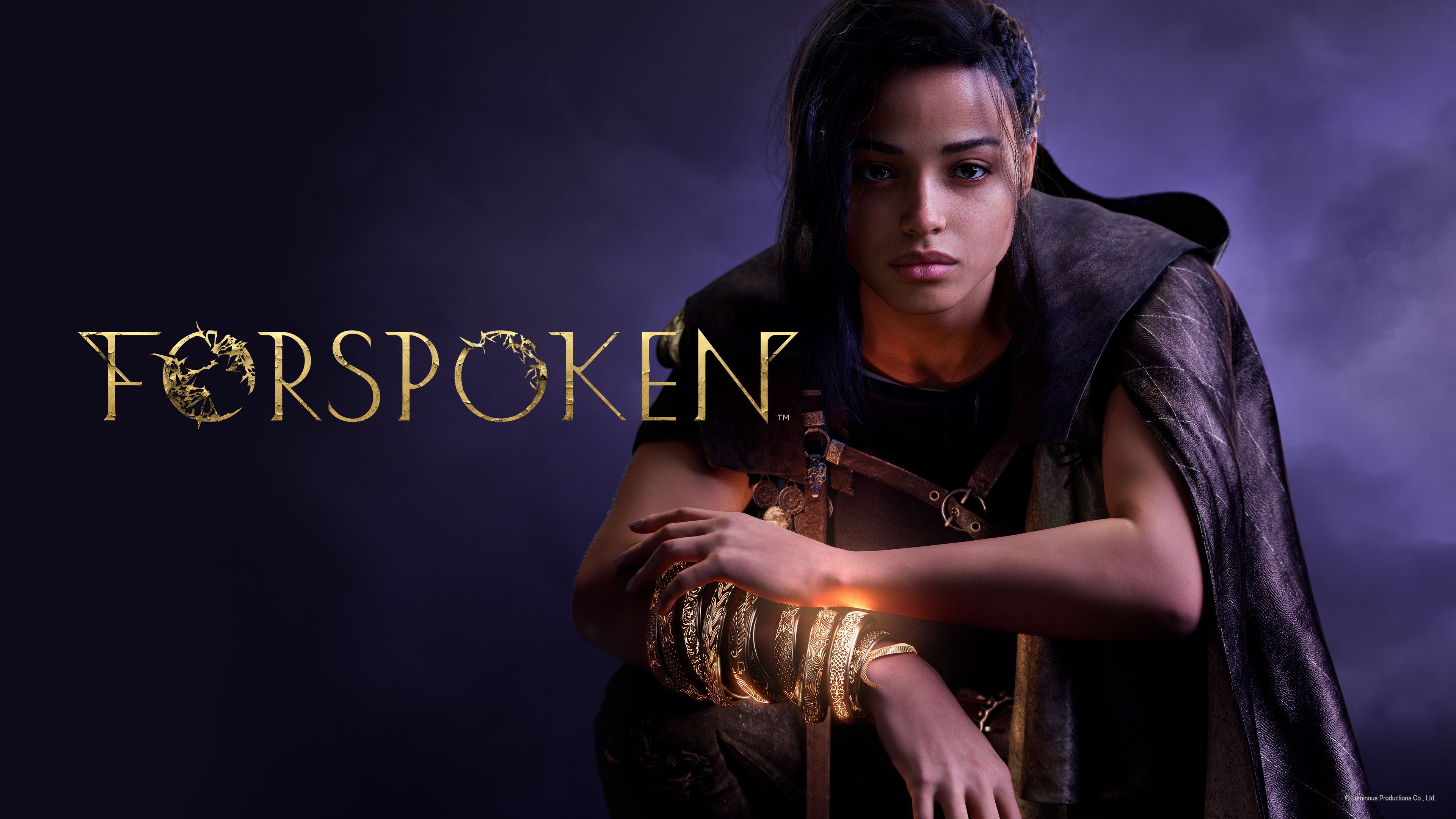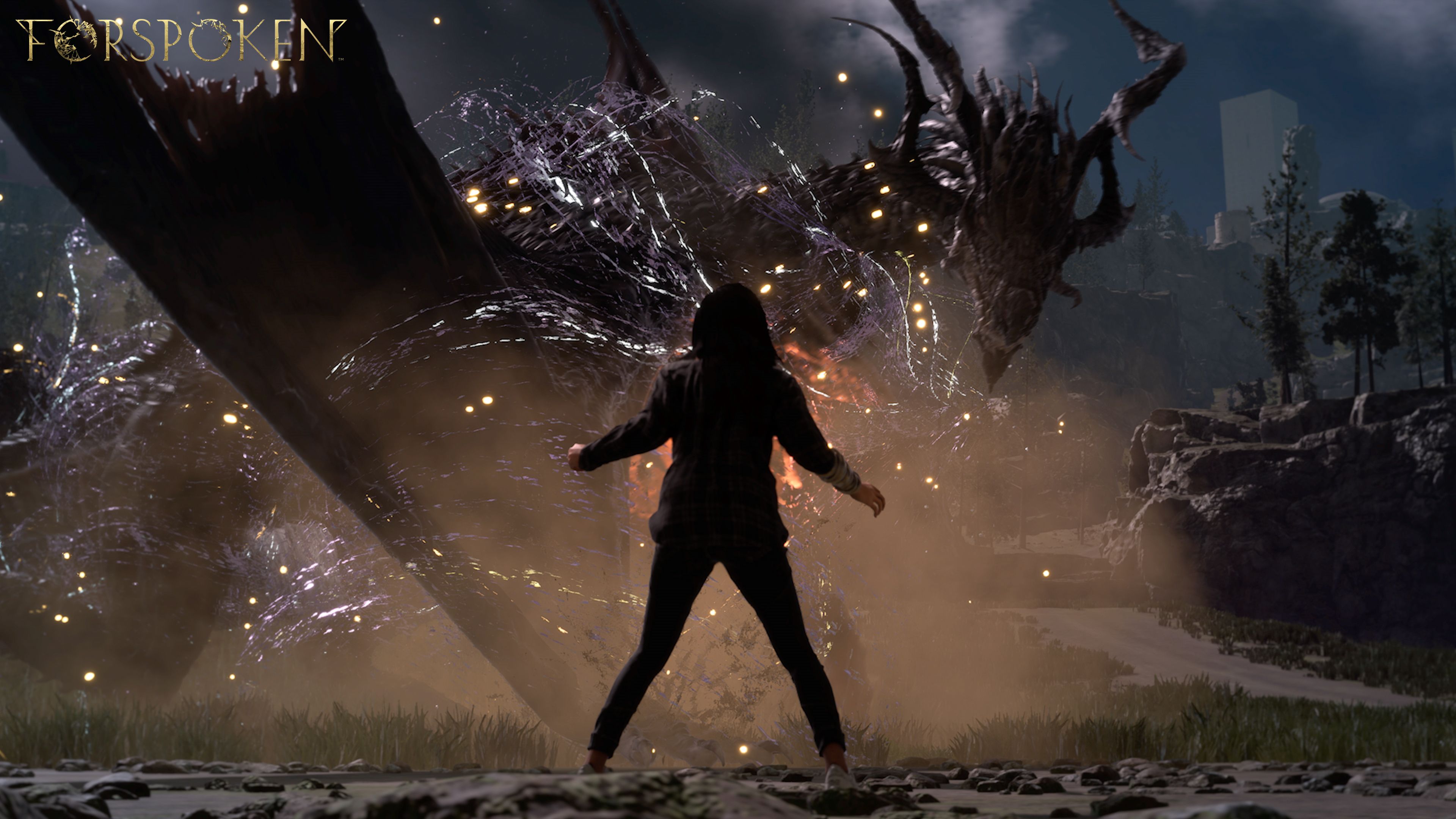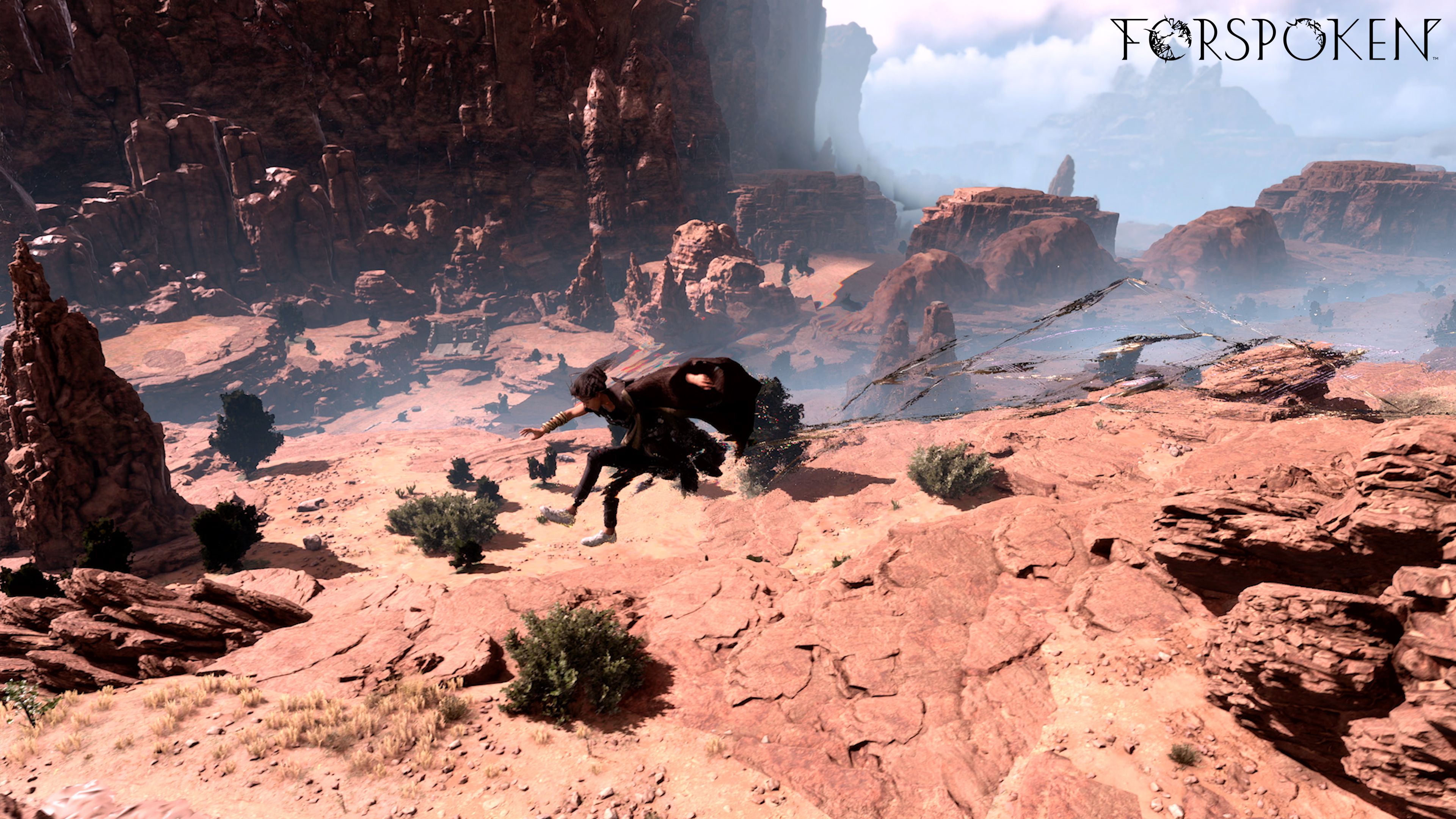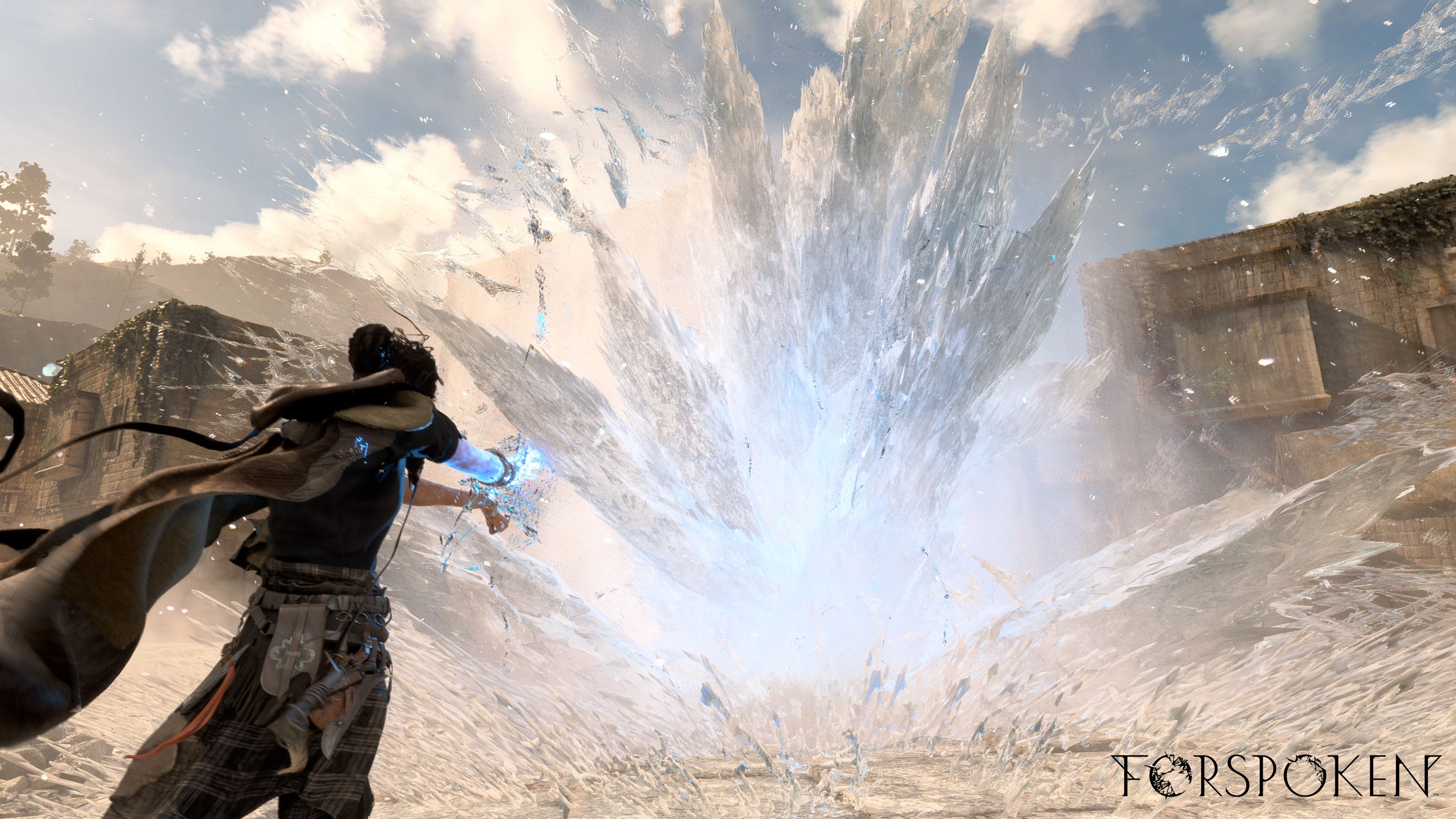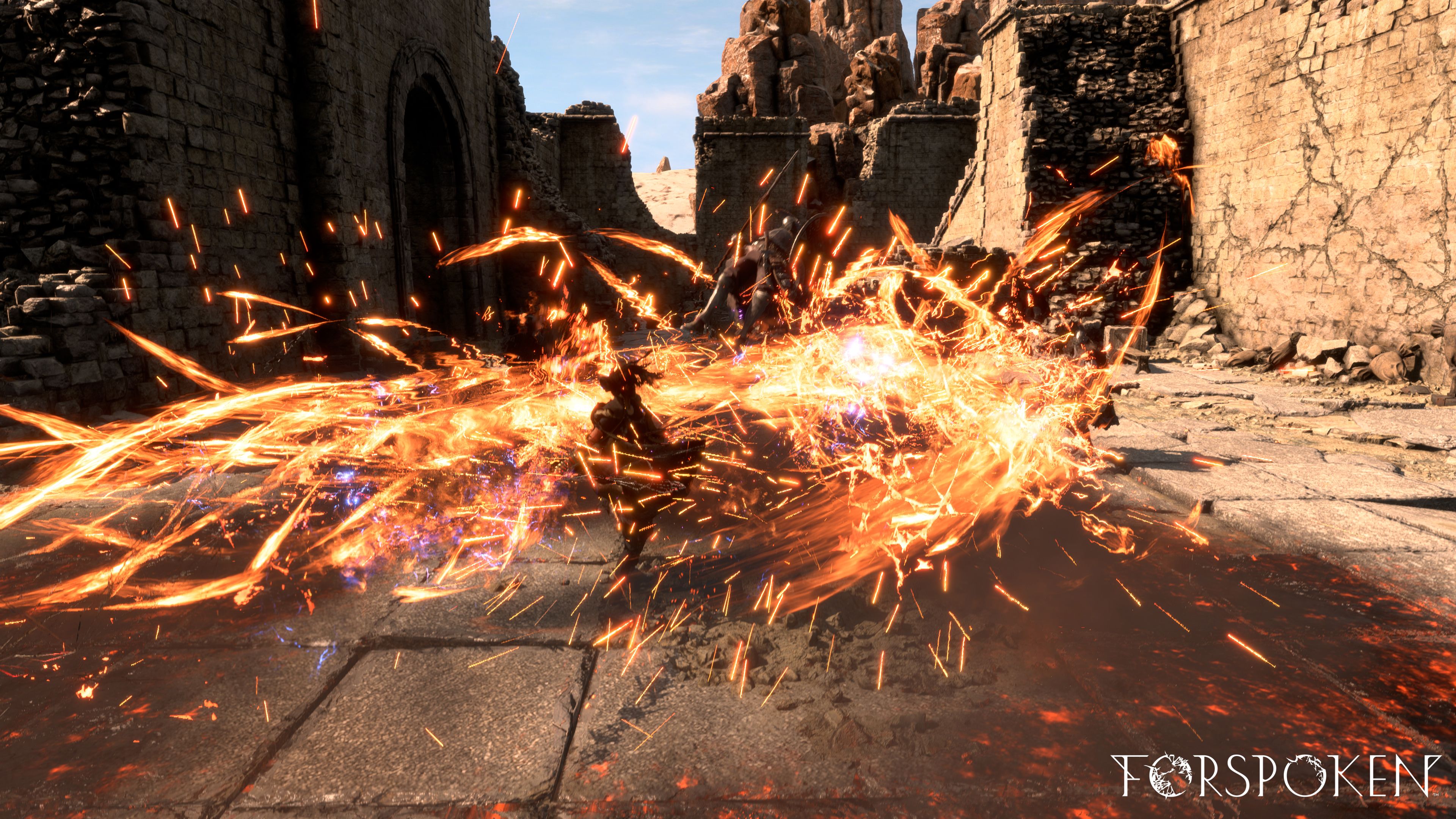Forspoken is a strange game. This upcoming open world fantasy adventure is helmed by a Japanese development team and western writing talent, hoping to capitalise on a global appeal that genre giants like Final Fantasy and Dragon Quest have perhaps lacked in the past. It seeks to appeal to a widespread audience I’m not really sure exists, and the results thus far reflect such a scattered direction. While potential is found across the realm of Athia, most of what I’ve seen feels dull, lifeless, and lacking a spark to bring it to life.
Last week I sat down to watch a hands-off presentation of Forspoken which sought to delve into the story of Frey Holland as she’s transported to the mythical world of Athia. This young woman is slowly but surely bursting into adulthood amidst the streets of New York City, finding herself working with unsavoury people and risking a descent into a life of crime. Having been brought up in a fractured care system, Frey is unwilling to trust those around her and opts for independence and isolation, her pet cat being one of the only sources of companionship in her life. So, when she’s dropped into Athia, it’s seen as an opportunity to grow and recognise the trust she’s grown so accustomed to pushing aside.
It’s a cool premise, albeit a generic one that we’ve seen in anime, manga and video games time and time again. It’s Final Fantasy meets The Wizard of Oz, and if Luminous is able to execute upon this with some original ideas it could shine - but right now I’m not so sure. During the preview I’m seldom given the circumstances behind her presence in this world, both in terms of what she is inevitably fighting for and what makes Athia so special. It’s described as a world without equal, beautiful and flawed as darkness threatens to swallow it into nothingness. Yet Square Enix feels afraid to showcase that, so as a result the brown and grey environments Frey soars across blend into a single, homogenous whole.
When the game was first revealed it was little more than a next-gen showcase. I understood this visual direction, and how all of these luscious effects and sprawling environments would eventually be given an identity, but here we are a handful of months away from launch and this lack of distinction remains. Maybe I’m being too harsh, but JRPGs are known for expressive character designs and worlds that aren’t afraid to lean into the absurd, so when Forspoken opts for hushed tones and relative realism it all grows forgettable. I admire a game that is willing to be different, giving a regional genre like this a global perspective that can allow it to grow into something new. And it still could, but I wish I was more excited.
The majority of Luminous Productions worked on Final Fantasy 15, a troubled project that spent years in development before finally being rebranded and becoming a game that is now seen as both polarising and beloved. The origins are clear in every frame of Forspoken. It builds on the movement, combat, and environmental complexity of its predecessor to create an experience that is infinitely more adventurous. Part of this is down to Frey’s movement, who can use her newfound magical powers to soar up buildings, dart through the sky, skate across ice, and become the ruler of a world that was once unknown. It looks tremendous, the periphery of Frey’s vision occupied by markers that likely represent optional missions and discoveries that can be found alongside the main quest. Frey also has an extensive levelling system complete with sprawling skill trees, different costumes, and a sense of progression that reflects the nature of a massive RPG, so there’s plenty we’re yet to see.
While movement seems kinetic and satisfying, I haven’t seen enough of Athia to know how it will be implemented beyond darting across rooftops and navigating lake beds with the elements - but I imagine Luminous has crafted a world that takes perfect advantage of them. I’d hate to be moving around like a superhero until I stumble across an open field and have to sprint for a few minutes like a normie. Forspoken might fall short in terms of characters and narrative right now, but its mixture of experimental movement and punchy combat is far from a shortcoming, and I hope the diversification of combining various spells and natural elements allow for a battle system that goes far beyond the button-mashing ways of Final Fantasy 15. If I spent 40+ hours spamming circle I’ll be pissed.
Frey has myriad powers at her disposal, capable of spawning arrows of ice from the ether to fire at enemies or turn a collection of rocks on the ground into a DIY machine pistol. It looks silly in practice, but equally badass as she forms rapturous waterfalls from nowhere or slams down a spear made of fire into the ground to murder dozens of oncoming soldiers. You’ll do combat with standard humanoids, ethereal wolves, and ghastly dragons breathing corrupt fire upon you. There’s plenty of variety spread across Forspoken’s characters and creatures, and I desperately hope the full game extends this variety onto the land of Athia and its unfolding narrative. Right now we’ve seen so little, as if Square Enix isn’t exactly keeping secrets, but is afraid to show whatever it has in fear of being ridiculed.
During the presentation we spent an extended period of time with Allison Rymer and Todd Stashwick, two of the lead writers responsible for bringing the world and characters of Forspoken to life. They fawn over the appeal of creating this fantasy world and giving life to a strong female character, often falling over their words while expanding on the foundations previously laid by Gary Whitta and Amy Hennig before the reins were handed over. Whitta also wrote After Earth and Rogue One, so I wouldn’t describe them as a writer with a solid grasp on the charisma required to sell a script and characters who can gel with the exuberance of JRPGs. If anything, it’s a combination I’d actively try to avoid.
Luminous Productions is piecing together the traversal, combat, and environments while a team of talented Western writers is responsible for selling the characters and narrative. It’s clearly a combination of factors hoping to capitalise on Forspoken’s potential global appeal, yet it also feels like a recipe for disaster if the tone and atmosphere end up clashing in ways that won’t become clear until the full game is placed in front of us. I can sympathise with this objective, wanting to break out of the established audience of Final Fantasy to create something entirely new, moving away from normative genre tropes to execute upon something unexpected. But you can’t fake creative ideas like this, and when you do the fallacy beneath it all becomes abundantly clear. Forspoken feels like that, akin to a fake video game you’d see in an episode of NCIS - like it shouldn’t exist but does and the full experience is almost impossible to imagine because the ingredients piecing it together are so generic.
I’m really tearing this thing apart, and I don’t intend to, but it feels like it could have been presented in a more compelling way to avoid the cynicism that comes with a project that has clearly been focus-tested so it can appeal to the largest demographic possible instead of chasing a vision that feels original. Forspoken needs to have something to say and not just try to be a fantasy adventure with all of the bells and whistles we’ve come to expect from such a blockbuster. If it can take the weaker elements of Final Fantasy 15 and curate them into a bold, original adventure it could be truly special, but right now I’m not so sure.

